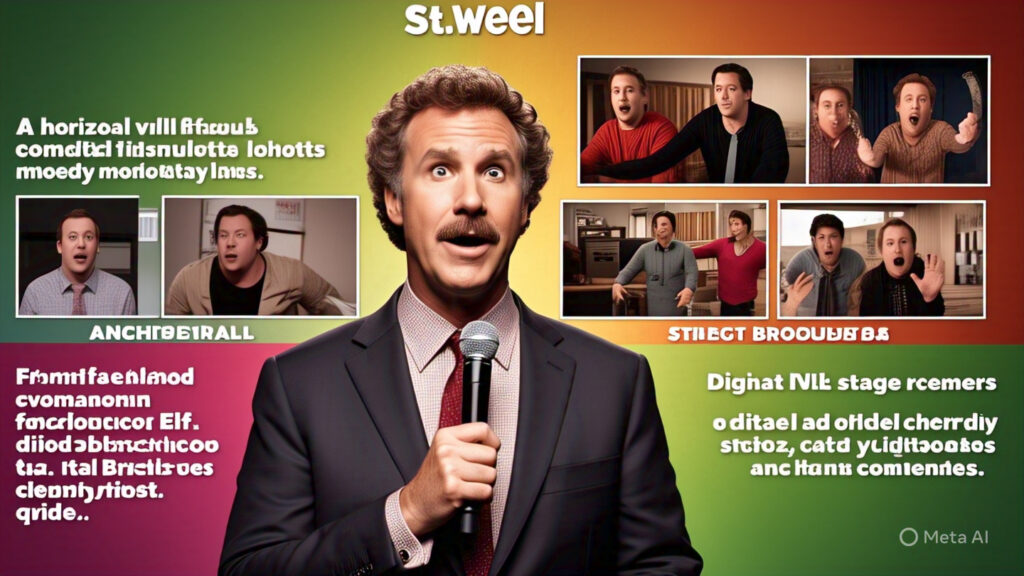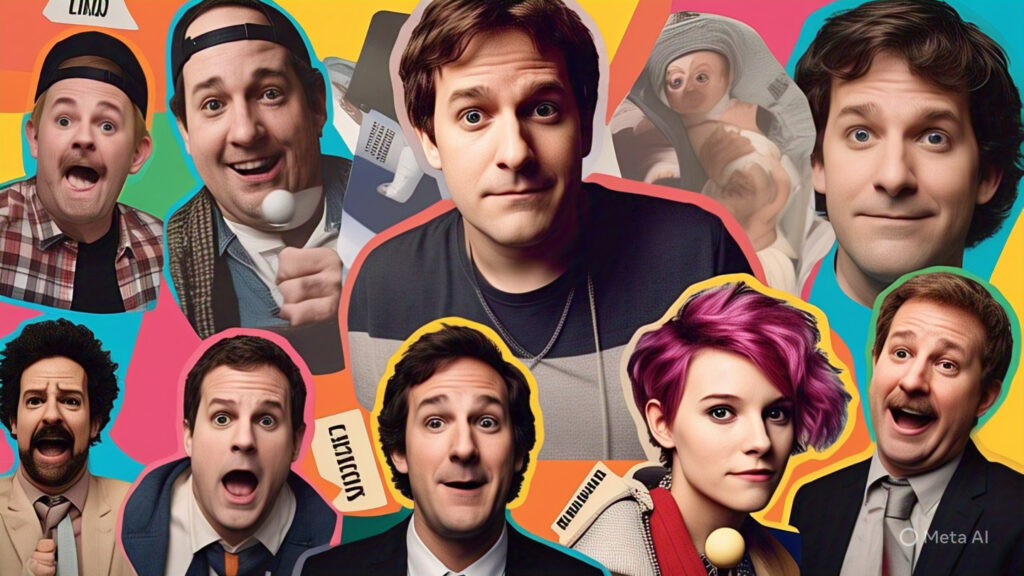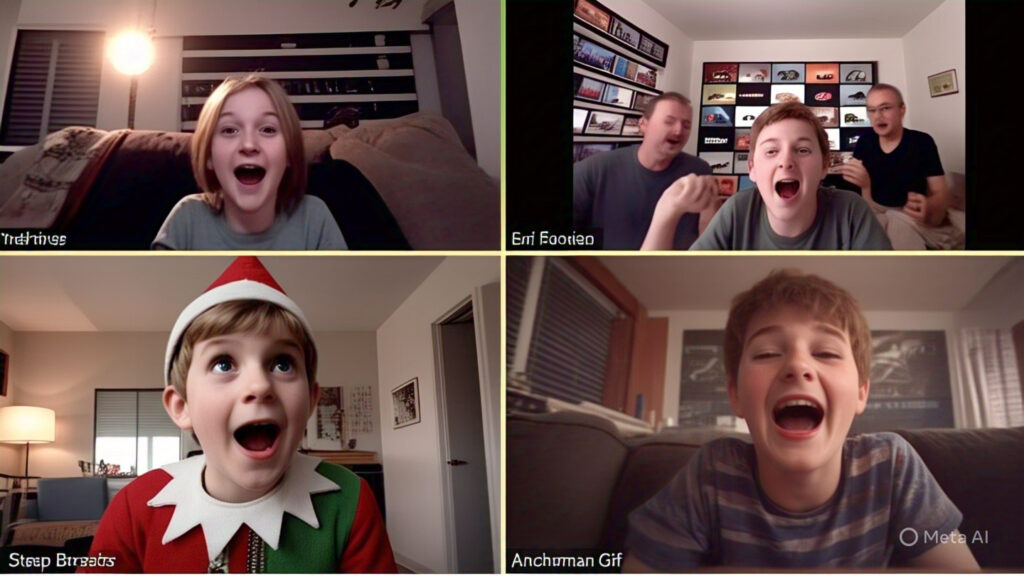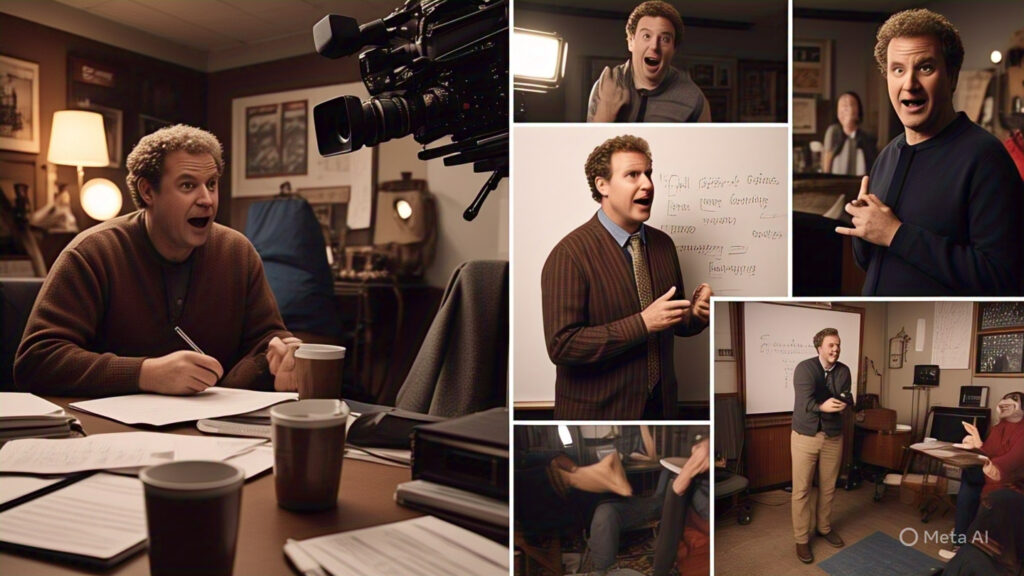Will Ferrell has carved a legendary space in the world of comedy—not by playing it safe, but by embracing the bizarre, the loud, and the wildly unexpected. Known for his eccentric characters, fearless improvisation, and impeccable comedic timing, Ferrell has become a defining figure in modern humor. This page explores the essence of his comedic genius—his signature roles, unique style, cultural influence, and the unforgettable laughs he’s delivered over the years.
From late-night sketch shows to box office-smashing comedy films, Ferrell’s career showcases an evolving yet consistent dedication to making people laugh. Through the sections ahead, we dive deep into what makes his comedy timeless and how it continues to inspire a new generation of comedians and fans alike.
The Essence of Will Ferrell’s Comedy
Will Ferrell’s comedic brilliance lies in his ability to blend absurdity with sincerity. He doesn’t just play a goofy character—he becomes that character with an intensity and conviction that makes even the most ridiculous scenarios hilariously believable. Whether he’s streaking across a college campus in Old School or leading a news team in Anchorman, Ferrell taps into a uniquely fearless brand of humor.
What Makes His Comedy Unique?
- Unpredictable Physical Humor: Ferrell often uses exaggerated body language and over-the-top movements to add visual punchlines.
- Deadpan Delivery: Even in the most bizarre situations, he maintains a straight face, making the comedy land even harder.
- Commitment to the Bit: No matter how strange the role, Ferrell never breaks character. This total commitment is what elevates his performances.
- Everyman Appeal: He frequently plays ordinary guys in extraordinary situations, making him highly relatable to wide audiences.
“Will Ferrell can turn even a single eyebrow raise into a punchline.” — Entertainment Weekly
Subgenres of Comedy He Excels In
| Comedy Type | Examples | Notable Traits |
|---|---|---|
| Satirical Comedy | Anchorman, The Campaign | Critiques media, politics, and society |
| Slapstick Comedy | Step Brothers, Talladega Nights | Physical gags, exaggerated movements |
| Absurdist Comedy | Zoolander, Elf | Ridiculous premises turned gold |
| Improvisational Comedy | Saturday Night Live, Anchorman | Spontaneous humor and unscripted lines |
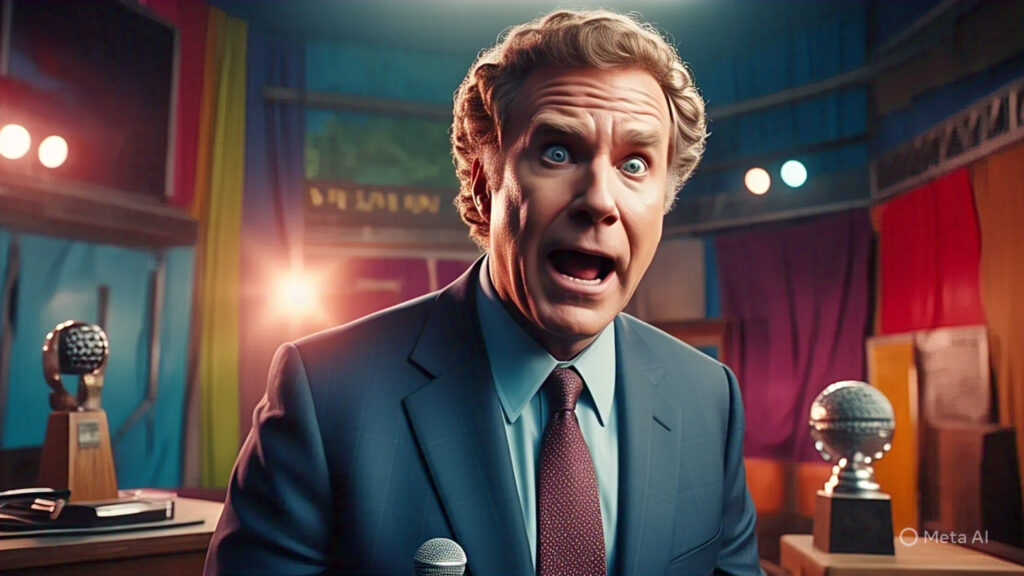
Signature Characters & Sketches
Will Ferrell’s legacy in comedy is built upon a gallery of unforgettable characters—each crafted with over-the-top personality, outrageous quirks, and that signature Ferrell charm. From late-night sketch comedy to blockbuster films, his characters are larger than life, yet somehow relatable, thanks to the emotional depth and fearless performance he brings to each role.
Whether it’s a clueless anchorman, a holiday elf, or a NASCAR driver obsessed with winning, Ferrell’s characters are embedded in the DNA of 21st-century comedy.
Iconic Film Characters
| Character Name | Movie | Description |
|---|---|---|
| Ron Burgundy | Anchorman | An egotistical news anchor with a flair for absurd quotes and 70s charm. |
| Buddy the Elf | Elf | A human raised at the North Pole, full of innocent wonder and childlike enthusiasm. |
| Ricky Bobby | Talladega Nights | A hot-headed race car driver obsessed with winning and speed. |
| Brennan Huff | Step Brothers | An unemployed man-child with a love for dinosaurs and a hatred for responsibilities. |
| Jackie Moon | Semi-Pro | A disco-singing basketball team owner desperate for fame. |
Each of these characters has become a cultural icon in its own right, known for catchphrases, costumes, and comedic timing that still inspire memes and fan tributes today.
Unforgettable Sketches from Saturday Night Live (SNL)
Before his film stardom, Ferrell honed his comedic skills on SNL, where he created some of the most quoted and replayed sketches in the show’s history.
- “More Cowbell” — As Gene Frenkle, Ferrell’s dramatic cowbell playing (paired with Christopher Walken’s deadpan) became legendary.
- “The Cheerleaders” — Playing Craig alongside Cheri Oteri, Ferrell embodied the overly enthusiastic, underqualified spirit of a high school cheerleader.
- “George W. Bush Impressions” — Ferrell’s exaggerated version of the U.S. President combined political satire with classic goofiness.
“His SNL characters were absurd, loud, and weirdly lovable—just like Ferrell himself.” — Rolling Stone
Character Traits That Define Ferrell’s Comedy
- Loud, exaggerated delivery
- Unexpected vulnerability beneath the chaos
- Clueless confidence
- Physical presence that commands the screen
- Overcommitment to ridiculous roles (e.g., singing in a leotard, wrestling a bear, or wearing elf tights)
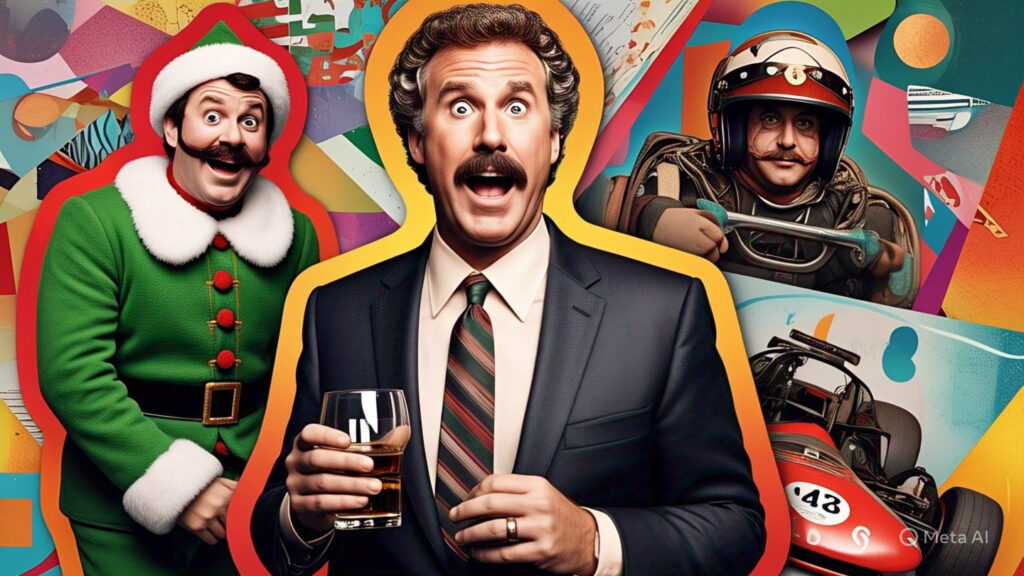
Collaborations That Made History
While Will Ferrell is a comedy powerhouse on his own, many of his most memorable moments have come through legendary collaborations with fellow actors, writers, and directors. These partnerships helped shape modern comedy cinema and created a chemistry that elevated each film into a cultural phenomenon.
Whether forming iconic duos on screen or working with behind-the-scenes geniuses, Ferrell’s best work often came from creative synergy—and a mutual love for pushing boundaries.
Frequent Collaborators & Their Impact
| Collaborator | Projects Together | Impact on Ferrell’s Comedy |
|---|---|---|
| Adam McKay (Director) | Anchorman, Step Brothers, Talladega Nights, The Other Guys | Helped define Ferrell’s satirical style with absurd, fast-paced storytelling. |
| John C. Reilly | Step Brothers, Talladega Nights, Holmes & Watson | Their chemistry created one of the most beloved comedy duos of the 2000s. |
| Tina Fey & Amy Poehler | SNL, Sisters, various award shows | Played off each other with razor-sharp wit and improvisation. |
| Paul Rudd & Steve Carell | Anchorman, Anchorman 2 | Formed the outrageous Channel 4 news team with brilliant ensemble energy. |
| Kristen Wiig | SNL, Anchorman 2, The Spoils of Babylon | Balanced Ferrell’s eccentricity with her own unique absurdism. |
On-Screen Magic: The McKay-Ferrell Era
The partnership between Will Ferrell and director Adam McKay marked a golden era of comedy in the 2000s. Their films broke the mold by combining satirical edge, absurdity, and improvised brilliance.
“We didn’t aim for realism—we aimed for ridiculousness that still had a heart.” — Adam McKay
Notable Features of Their Style:
- Over-the-top plotlines grounded in real-world settings
- Long-form improvisation turned into scripted scenes
- Satire of American culture, media, and politics
Behind the Laughs: Producing Partners
In 2006, Ferrell and McKay co-founded Gary Sanchez Productions, which backed a string of successful comedy films and series. Later, Ferrell also co-launched Funny or Die, a digital platform that became a launchpad for online comedy content, supporting creators and actors worldwide.
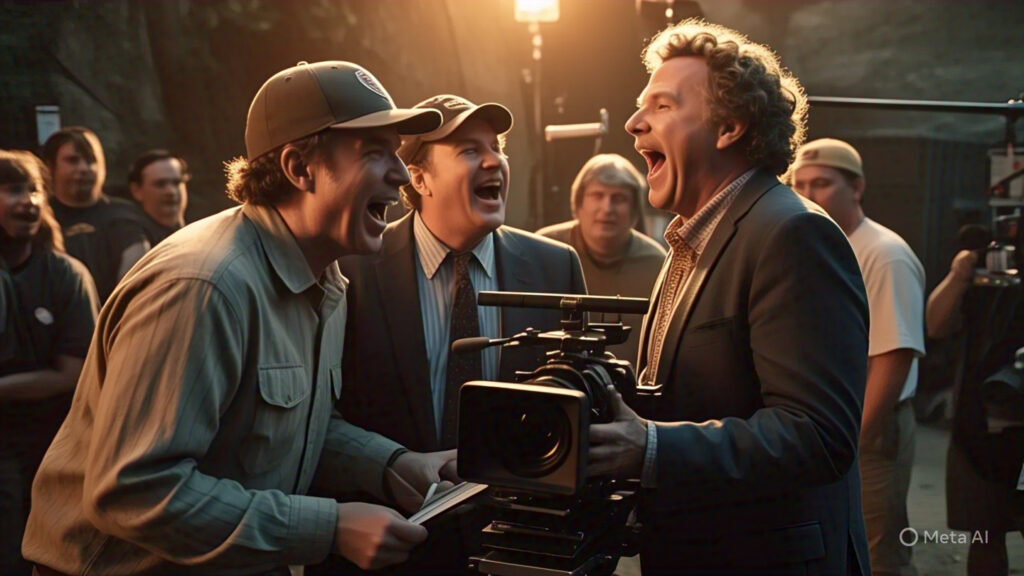
Will Ferrell and the Evolution of Modern Comedy
Will Ferrell didn’t just participate in the rise of modern comedy—he reshaped it. By blending traditional slapstick with absurdity, satire, and sharp improvisation, Ferrell helped usher in a new era of comedic storytelling in the early 2000s that still influences writers and performers today.
His fearless performances, combined with bold direction and boundary-pushing scripts, made him the face of a movement where characters could be ridiculous and emotionally layered at the same time.
From Sketch to Screen: A Shift in Tone
In earlier decades, comedy films often relied on predictable formulas and punchlines. Ferrell—especially through his collaborations with Adam McKay and Judd Apatow—changed the game by emphasizing:
- Improvisational dialogue that felt raw and spontaneous
- Absurd characters placed in realistic settings
- Heightened emotional reactions to mundane situations
- Satirical takes on media, politics, sports, and masculinity
This shift made films like Anchorman, Talladega Nights, and Step Brothers not just comedies, but commentaries wrapped in outrageous laughs.
Key Elements of Ferrell’s Modern Comedy Influence
| Element | Description |
|---|---|
| Absurd Confidence | Characters who are wildly confident, even when they’re clearly wrong (e.g., Ron Burgundy, Ricky Bobby). |
| Emotional Depth in Ridiculous Roles | Shows vulnerability even in the most exaggerated personas. |
| Pop Culture Parody | Often mocks and magnifies elements of American culture, from news media to sports fandom. |
| Physical Comedy | Uses body language, exaggerated movements, and costumes to build laughs beyond words. |
| Collaborative Improvisation | Encourages ensemble casts to riff off each other, creating unforgettable group dynamics. |
Impact Beyond Film
Ferrell’s influence spread into digital comedy and television formats as well:
- Funny or Die redefined what internet sketch comedy could be, influencing platforms like CollegeHumor and later YouTube creators.
- His guest appearances on shows like The Office, Eastbound & Down, and The Last Man on Earth brought his distinct comedic flavor to serialized TV.
“Will Ferrell didn’t just make us laugh—he changed how we expected to laugh.” — The Atlantic
Memorable One-Liners & Quotes
One of the defining traits of Will Ferrell’s comedy legacy is his unmatched ability to deliver instantly iconic one-liners. Whether he’s portraying a clueless newscaster, a man-child stepbrother, or a delusional racecar driver, Ferrell’s lines stick with audiences long after the credits roll.
These quotes aren’t just funny—they’ve become part of pop culture. They’re quoted at parties, printed on t-shirts, turned into memes, and even referenced in professional settings with a knowing wink. Ferrell’s dialogue transcends scenes and scripts—it becomes language we live with.
Top 10 Will Ferrell Quotes That Became Legendary
| Movie / Show | Iconic Quote |
|---|---|
| Anchorman | “I’m kind of a big deal.” |
| Step Brothers | “Did we just become best friends?!” |
| Talladega Nights | “If you ain’t first, you’re last.” |
| Elf | “I’m a cotton-headed ninny muggins!” |
| Blades of Glory | “No one knows what it means, but it’s provocative!” |
| Anchorman 2 | “By the hymen of Olivia Newton-John!” |
| The Other Guys | “I’m a peacock, you gotta let me fly!” |
| SNL – More Cowbell | “I gotta have more cowbell!” |
| Zoolander (as Mugatu) | “I feel like I’m taking crazy pills!” |
| Old School | “We’re going streaking through the quad!” |
Why These Quotes Work
Ferrell’s delivery style is a combination of:
- Deadpan confidence in absurd statements
- Exaggerated emotional intensity
- Pauses, repetition, and vocal tone shifts
- Improvised timing that feels organic and unfiltered
“I’m not just yelling lines. I’m channeling someone who truly believes every ridiculous word they’re saying.” — Will Ferrell
This authenticity, even in complete nonsense, makes the humor land harder and linger longer.
Honorable Mentions from Interviews & Sketches
- “I wake up in the morning and I piss excellence.” — Talladega Nights
- “I don’t know how to put this, but I’m kind of a big deal.” — Anchorman
- “This house is a fing prison on Planet Bulls in the galaxy of This Sucks Camel D***!” — Step Brothers
These lines may be comedic, but they also reflect deeper satirical commentary on ego, masculinity, and American culture—all while being hilarious.
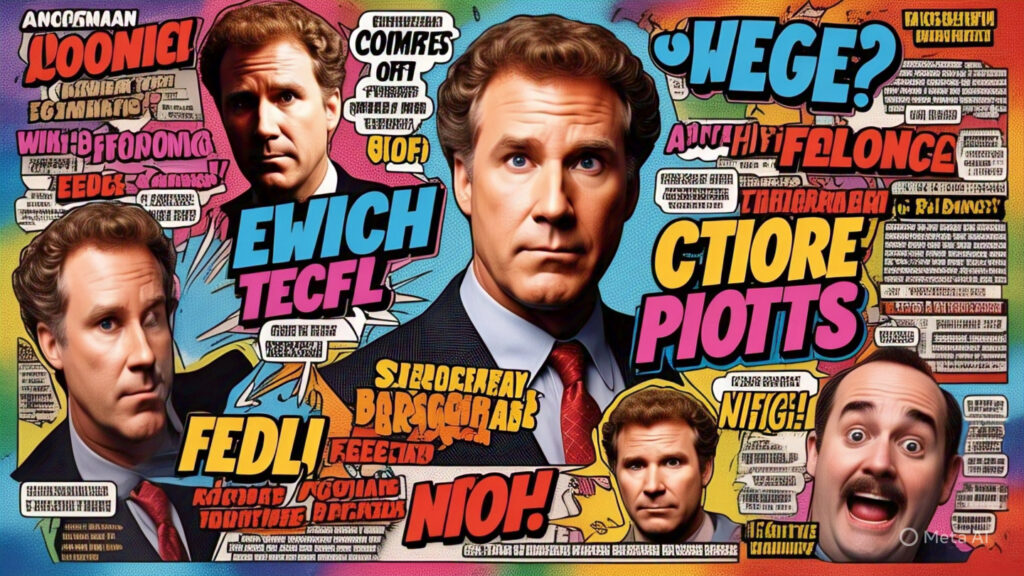
Ferrell’s Influence on New Age Comedians
Will Ferrell didn’t just dominate the comedy scene—he inspired an entire generation of comedians, writers, and creators who grew up watching his absurd, fearless, and emotionally charged performances. His comedic DNA is now found everywhere: in sketch groups, stand-up routines, sitcoms, YouTube sketches, and even TikTok trends.
The “Ferrell formula” blends raw improvisation, exaggerated yet emotionally grounded characters, and unapologetic silliness. This unique mix reshaped what it meant to be funny in the 21st century—and new age comedians have taken the baton and run with it.
Traits That Today’s Comedians Borrow from Ferrell
| Ferrell’s Influence | How It Shows in New Comedy Talent |
|---|---|
| Loud, confident idiocy | Comedians like Eric André & Tim Robinson channel similar wild energy. |
| Dead-serious delivery of nonsense | Seen in shows like I Think You Should Leave and Nathan for You. |
| Improvisational freedom | Modern performers push boundaries by riffing unscripted, just like Ferrell did in Anchorman. |
| Mix of satire and silliness | Comedy now often critiques society while being over-the-top funny. |
| Absurdity as truth-telling | Emerging comics tackle serious topics using absurd humor—just like Ferrell’s best roles. |
Comedians Who Credit Will Ferrell as an Influence
- Bo Burnham – Known for mixing irony, absurdism, and vulnerability—key pillars of Ferrell’s style.
- Andy Samberg – From SNL to Brooklyn Nine-Nine, his comedic tone echoes Ferrell’s.
- Kate McKinnon – Merges outrageous characters with sincere commitment, Ferrell-style.
- Zach Galifianakis – His offbeat, deadpan weirdness follows the Ferrell tradition.
- Tim Robinson – Former SNL writer who uses Ferrell’s aggressive absurdism in his own show.
“Will Ferrell taught us that you can go big—really big—and still make people care about your character.” — Kate McKinnon, Interview with Variety
Legacy Beyond the Big Screen
Will Ferrell also paved the way for alternative comedy platforms. His co-creation of Funny or Die provided a home for experimental, offbeat humor and gave early exposure to rising talents like:
- Adam Devine (Workaholics)
- Aubrey Plaza
- Donald Glover
This helped democratize comedy and made it accessible beyond traditional TV and film studios.
Audience Connection & Cultural Impact
While Will Ferrell’s roles are often loud, absurd, and larger than life, they resonate deeply with audiences across the globe. Why? Because beneath the wild wigs, the outrageous quotes, and the full-volume monologues lies something real—a vulnerable, human core that viewers instinctively connect with.
Ferrell’s comedy isn’t just about making people laugh—it’s about creating shared cultural experiences that live on in how people talk, joke, and see the world. From holiday traditions to everyday slang, Will Ferrell’s impact has gone beyond cinema and into the fabric of pop culture.
Emotional Resonance in Absurdity
What makes Ferrell’s comedy so enduring is how it mixes emotional relatability with total ridiculousness. Whether he’s a 6’3″ elf looking for his dad or a washed-up racecar driver trying to reclaim his glory, his characters:
- Feel misunderstood
- Are hungry for validation
- Want to belong
- Often deal with failure in hilarious ways
This creates a surprising emotional payoff for audiences—even while they’re laughing out loud.
Cultural Touchstones Created by Ferrell
| Cultural Moment or Phrase | Origin | Cultural Significance |
|---|---|---|
| “More cowbell!” | SNL sketch with Blue Öyster Cult | Used to express obsessive enthusiasm, now meme royalty |
| “You sit on a throne of lies.” | Elf | A go-to roast in holiday conversations |
| “I’m kind of a big deal.” | Anchorman | A staple in self-deprecating humor |
| “Shake and bake!” | Talladega Nights | Widely quoted in sports and team hype culture |
| “Did we just become best friends?!” | Step Brothers | Universally used to celebrate instant bonds |
These lines and characters have become part of how we talk to each other. They’ve been:
- Quoted in classrooms and boardrooms
- Referenced in sports commentary
- Used in political parodies
- Even printed on mugs, posters, and pajamas
Influence on Advertising & Social Media Culture
Will Ferrell’s influence is also seen in:
- Viral marketing (like the Ron Burgundy campaigns for Dodge)
- GIF culture (thousands of GIFs from Elf, Anchorman, and Step Brothers)
- Branded memes that use his expressions to react to everything from politics to parenting
“He’s like a living meme factory—except his jokes actually have heart.” — Pop Culture Digest
Multi-Generational Appeal
Ferrell has fans from:
- Children (thanks to Elf)
- Teens and young adults (Step Brothers, Talladega Nights)
- Adults and parents who grew up with his SNL days and still find relevance in his humor
This broad reach makes him a rare comedy figure who spans decades and demographics.
Behind the Scenes: Improvisation and Writing Style
While Will Ferrell’s characters often feel wildly spontaneous, that’s no accident—it’s the result of a master at work behind the scenes, blending improvisational genius with a distinct writing sensibility. Ferrell is not just a comedic performer; he’s a creative force who co-writes, shapes, and evolves much of the material he brings to life.
This final section pulls back the curtain to explore how Ferrell builds comedy from the ground up—through improv-heavy scenes, character-building sessions, and a writing style rooted in absurd yet grounded scenarios.
Improvisation: The Ferrell Method
Ferrell’s most iconic scenes were often unscripted, with directors allowing cameras to roll while he experimented. This method created timeless moments:
- Ron Burgundy’s “Glass Case of Emotion” – improvised on the spot.
- Elf’s coffee shop performance (“You did it! Congratulations!”) – mostly improvised reactions.
- Step Brothers job interview scenes – Ferrell and John C. Reilly riffing with zero filters.
“Improvisation lets you discover the real character. The stuff that isn’t written is often the stuff people remember.” — Will Ferrell, in a GQ interview.
Improvisation Toolkit:
- No fear of silence or awkwardness
- Say “yes, and…” to build scenes
- Overcommit to absurd premises
- Make it emotional—even when it’s ridiculous
Writing Style: Absurd, Grounded, and Emotionally Invested
Ferrell’s writing process often starts with a question like:
“What if an incredibly stupid man took his job way too seriously?”
From there, the team constructs a world around that ridiculous premise—and populates it with oddly relatable conflicts and motivations.
Key Traits of Ferrell’s Writing:
- Absurdism with a human heart
Even in the wildest roles, his characters want love, success, or validation. - World-building through character
The humor stems from how the character behaves in a logically consistent yet insane world (e.g., Anchorman’s 1970s news universe). - Collaborative scripting
Frequent collaborators like Adam McKay and Chris Henchy help brainstorm, revise, and refine lines—with plenty of room for improv.
How Ferrell Uses the Room
In writing sessions, Ferrell is known for:
- Acting out ideas live before they hit the page
- Looping in other actors early, especially those with strong improv chops
- Testing dialogue aloud to gauge laughs before finalizing scenes
This process gives his films a loose, real energy that doesn’t feel overly scripted—even when it is.
Behind-the-Scenes Trivia
- The script for Anchorman originally featured a plane full of newsmen fighting off ninjas and orangutans—because why not?
- In “Step Brothers,” over 50% of scenes had improvised dialogue.
- Ferrell handwrites most of his early scene drafts before digitizing them.
Ferrell in Digital Comedy and Memes
In an era where memes and viral content shape pop culture, Will Ferrell has found a second comedic life online. His legacy extends far beyond the big screen—his face, catchphrases, and expressions have been repurposed into reaction GIFs, parody accounts, and viral memes that dominate social platforms like X (formerly Twitter), Instagram, Reddit, and TikTok.
Ferrell didn’t just survive the shift to digital humor—he became one of its most recycled icons.
The Rise of Will Ferrell Memes
From Anchorman to Elf, his filmography is a goldmine for meme creators. These scenes work because:
- They’re highly expressive and exaggerated, perfect for visual humor.
- The dialogue is punchy and adaptable, fitting multiple situations.
- The characters often speak in mock-serious tones, ideal for satire.
Top Meme Moments
| Meme Format | Origin | Used For |
|---|---|---|
| “I’m kind of a big deal.” | Anchorman | Bragging with irony |
| “Did we just become best friends?!” | Step Brothers | Celebrating instant connections |
| “You sit on a throne of lies.” | Elf | Calling out fake or exaggerated claims |
| Crying in the phone booth | Anchorman | Over-the-top emotional reactions |
| “Shake and bake!” | Talladega Nights | Celebrating partnerships or teamwork |
These memes are not just shared—they are used as modern language on the internet.
Funny or Die: Ferrell’s Digital Empire
In 2007, Will Ferrell co-founded Funny or Die, a comedy platform that revolutionized online sketch comedy.
First viral hit: The Landlord
– Ferrell is yelled at by a toddler landlord (played by McKay’s daughter)
– Over 80 million views and still iconic
Why Funny or Die Mattered:
- It proved that A-list talent could thrive in short-form digital comedy.
- Gave upcoming comedians a platform (e.g., Zach Galifianakis, Eric Andre).
- Inspired dozens of other brands to invest in original web content.
From Scripted Scenes to Reaction Content
As platforms like TikTok and Instagram Reels rose, Ferrell’s classic scenes were recycled, lip-synced, and remixed:
- Users perform Step Brothers lines for roommate or sibling humor.
- Anchorman monologues are now used in business and leadership satire.
- “Elf” dances are Christmas meme staples.
Many younger fans who haven’t seen the original movies still know Ferrell through:
- GIF keyboards
- Meme pages
- Trending sounds
Fan Engagement in the Meme Era
Ferrell’s ability to:
- Not take himself too seriously
- Allow his characters to become avatars for digital humor
- Occasionally interact with his own meme-legacy in interviews and ad campaigns
…has cemented him as not just a celebrity but a self-aware internet icon.
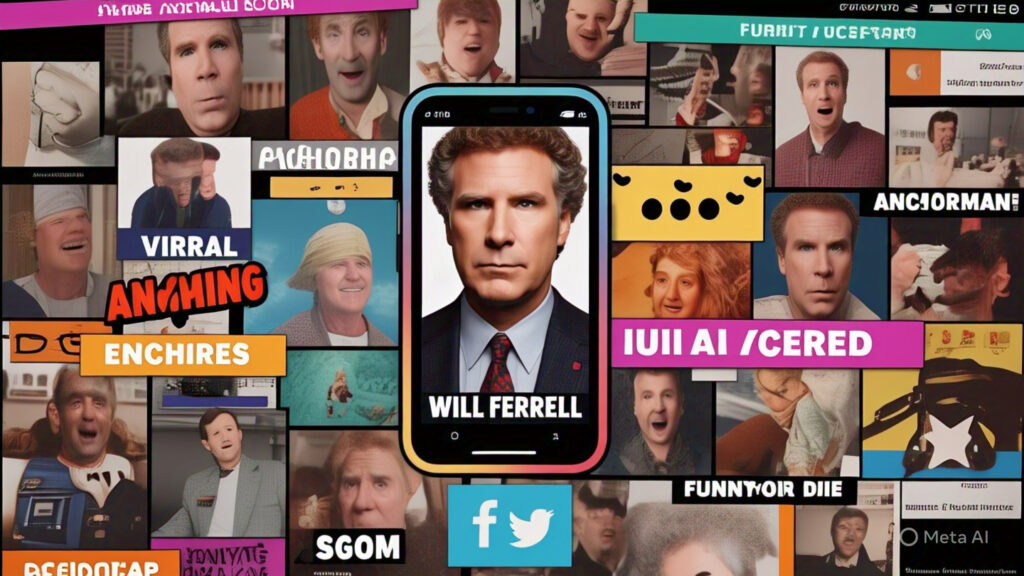
Conclusion: Why Ferrell’s Comedy Still Works Today
After decades in the spotlight, one question remains: Why does Will Ferrell’s comedy still resonate today? The answer lies in his ability to blend timeless character work, emotional absurdity, and an ever-evolving comedic instinct that adapts with culture, not against it.
Ferrell’s brand of humor—loud, silly, yet oddly sincere—remains just as funny in the age of memes as it was in early 2000s cinema. Whether you’re a longtime fan or part of the generation that discovered him through GIFs and TikToks, his appeal is undeniably multi-generational.
Key Reasons His Comedy Endures
- Emotional Authenticity in Absurd Roles
Behind every wild character is a real human emotion—loneliness, insecurity, ambition, or love. - Character-Driven Humor > Situational Gags
Ferrell doesn’t just chase punchlines—he becomes a person so ridiculous and committed that the comedy writes itself. - Improv That Feels Alive
Even his oldest performances feel fresh because of their unpredictable energy and fearless delivery. - Digital Adaptability
His content was memeable before memes existed. Ferrell’s scenes can be clipped, remixed, and reinterpreted without losing impact. - Collaborative Spirit
He surrounds himself with co-creators who challenge and elevate the work—from Adam McKay to John C. Reilly and beyond.
The Bigger Picture: A Legacy of Laughter
Will Ferrell didn’t just play funny characters—he helped define what modern funny looks like. He blurred the line between clown and thinker, satirist and child-at-heart. He gave us catchphrases we still quote, GIFs we still share, and movies we return to for comfort, joy, and tears of laughter.
“Comedy is about committing to the bit, no matter how dumb it feels—because the moment you believe in it, the audience will too.”
— Will Ferrell
A Lasting Gift to Comedy Fans
Ferrell has carved out a unique space in comedy history by:
- Refusing to chase trends
- Trusting his audience’s intelligence
- Allowing silliness to be sacred
Whether he’s yelling in a phone booth, racing in NASCAR, or singing at a Eurovision contest, Will Ferrell continues to make us laugh—by being fully, unapologetically himself.
